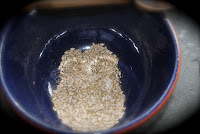What is so difficult about making our own bread - and since when have we all become so 'fussy' (or whatever it is) that only something that is pure rubbish from a shop can be called bread and even eaten on a regular basis in most people's diets?
For nearly 7 years I went without bread of any kind in an effort to remove anything that might be causing or contributing to gut and digestive issues (and nearly everything else!) that I was having. And of all the things that I gave up for such a long period of time, bread was the one food that I really missed.
When I started adding foods back into my diet after some level of healing had taken place, I wanted it to be the best and it had to be gut friendly. The best grain for bread as far as I am concerned is spelt (whole grain organic) which is easy to work with but does take some getting used to and is well worth the effort.
 |
| Seeds and bread soda in the bread bowl |
To make a nice loaf of bread from spelt flour there are only a few rules that should guide you:
-once it is wet you have about 4 minutes to mix (don't over mix) and get it in the oven
-when used for baking (scones, pies etc.) keep the dough cold and it works better
-water is the magic ingredient for taste and texture (clean well water is key)
As well, try not to get into the same rut as the rest of our cooking and meals where bread is concerned, there are so many kinds that can be made at home with common ingredients around the kitchen, so variety is easy to be had. Below is a list of some of the breads that I would be baking throughout a typical month;
- Rosemary olive bread (leftover olives from the market are great for this)
- Honey oat bread (use local honey)
- Herbed bread (I often use thyme, oregano and rosemary)
- Cinnamon raison bread (with loads of seeds)
- Plain Soda bread
- Goat's cheese & herb bread (chèvre and thyme, rosemary or tarragon)
- Onion & herb bread (any kind of herb with scallions)
- Naan bread (lovely with sesame seeds)
- Scones (any kind! But I love fruit such as cherry and goat's yogurt)
- Buns and rolls (quickly made for a meal)
- Muffins of all kinds (my favourite are cheese and herb, or sweet ones
When it comes to bread it is nearly impossible to run out of ideas and each day the bread can be made with slightly different ingredients depending what you have on hand. Bread is best made in small batches fresh each day, just a loaf or two at the most.
 |
| Spelt flour being mixed in with the seeds and soda etc |
In damp, wet climates such as Ireland, soda bicarbonate has traditionally been used when baking bread and does not cause any of the problems found with yeasted breads. I would recommend using baking soda for all your baking and staying away from yeasts and molds as they cause problems with the gut and digestion.
Another thing that I wanted to mention here as well - bread is usually not the problem when it comes to digestion and gut issues in general. There are far worse 'foods' coming into the diet that can be removed first and improvements will be seen. Start with sugar, caffeine, dairy, wheat, alcohol, Night Shades, processed foods and ready meals if you want to see some immediate benefit to your health - there are lots of ways to make positive changes in any diet.
 |
| Herbed bread |
Off to make some more jams,
Have a lovely day,
April
**Believe it or not there are some great quotes about bread, it is that important to us as humans -
"How can a nation be great if its bread tastes like Kleenex?"
--Julia Child
--Julia Child
"There are people in the world so hungry, that God cannot appear to them except in the form of bread." --Mahatma Gandhi
No comments:
Post a Comment